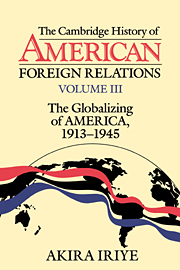Book contents
- Frontmatter
- 1 The age of European domination
- 2 The Great War and American neutrality
- 3 The United States at war
- 4 The Versailles peace
- 5 The 1920s: the security aspect
- 6 The 1920s: the economic aspect
- 7 The 1920s: the cultural aspect
- 8 The collapse of international order
- 9 Totalitarianism and the survival of democracy
- 10 The emergence of geopolitics
- 11 The road to Pearl Harbor
- 12 The global conflict
- Bibliographic Essay
- Index
- THE CAMBRIDGE HISTORY OF AMERICAN FOREIGN RELATIONS
- References
12 - The global conflict
Published online by Cambridge University Press: 28 March 2008
- Frontmatter
- 1 The age of European domination
- 2 The Great War and American neutrality
- 3 The United States at war
- 4 The Versailles peace
- 5 The 1920s: the security aspect
- 6 The 1920s: the economic aspect
- 7 The 1920s: the cultural aspect
- 8 The collapse of international order
- 9 Totalitarianism and the survival of democracy
- 10 The emergence of geopolitics
- 11 The road to Pearl Harbor
- 12 The global conflict
- Bibliographic Essay
- Index
- THE CAMBRIDGE HISTORY OF AMERICAN FOREIGN RELATIONS
- References
Summary
The diplomacy of war
World War II (1939–45) was far more global than World War I. Few areas of the world, if any, were untouched by the conflagration that had begun in Europe, spread to Russia and the Middle East, merged with the Asian war, and even involved Latin America. The entire world became divided into the allies (officially termed the United Nations) and the Axis, with a few nations (e.g., Spain, Sweden, and Switzerland) maintaining neutrality.
Only the United States, however, could be said to be involved in all theaters of the war, in the Atlantic as well as the Pacific, in North Africa as well as Southeast Asia, and in the Middle East as well as South America. In this sense the war was the culminating point in the story of the steady globalization of the United States; having established its leadership position during World War I, it now exercised its role militarily, economically, and ideologically so forcefully that the world after World War II could truly be said to have been a product of American power and influence.
This is not the place to recount in detail the course of the war. Suffice it to say that in terms of military developments there were three stages in the history of World War II as far as the United States was concerned: from December 1941 to January 1943; from January 1943 to August 1944; and from then on to the end of the Pacific war in August 1945. The first three sections in this chapter briefly describe the course of the war in these three stages and point to some key themes in U.S. strategy and foreign policy as the nation fought the war and at the same time prepared for the peace.
- Type
- Chapter
- Information
- The Cambridge History of American Foreign Relations , pp. 191 - 216Publisher: Cambridge University PressPrint publication year: 1993
References
- 1
- Cited by



